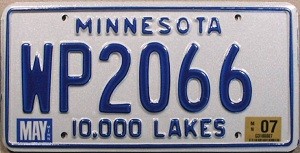DWI | DUI
St. Cloud DWI Attorney
DWI cases are some of the most complex cases as they are dealt with in criminal court where the penalties can include jail time and fines, and a civil hearing where penalties include loss of driving privileges and driving restrictions. It is important to note the time restrictions. You have 30 days from the date of the Notice and Order of Revocation to request a hearing, or you waive all rights and issues, even if you had a winning case and the officers made errors.
DWI/DUI
DWI stands for driving while intoxicated. In Minnesota the legal limit for blood alcohol content (BAC) is .08. An individual will likely be charged with DWI when they are above the legal limit of alcohol or under any controlled substance and operating a motor vehicle, motor boat, ATV, snowmobile or other motorized device.
When you are pulled over, police officers are trained to ask the individual to do field sobriety tests. These are voluntary and may be declined. If the individual participates, the officer is observing each movement during these tests. Then the officer typicality requests a voluntary preliminary breath test, which is not admissible in court. The officer uses these to determine if the individual is likely impaired and then asks the individual to submit to a chemical test under the implied consent statute. By operating a motor vehicle in Minnesota, you have already given permission for the state to collect a urine, blood or breath sample to determine your level of impairment. If you refuse this test, you face automatic loss of driving privileges.
Criminal Court Penalties
There are four classes of DWIs carrying different penalties and mandatory minimums for repeat offenders.
1st degree DWI: A person’s fourth or subsequent DWI is a felony and carries up to seven years prison, a fine of up to $14,000 and mandatory penalties.
2nd degree DWI: This is a gross misdemeanor and carries up to one year jail time and $3,000 fines. It is a DWI plus two or more aggravating factors, such as a test refusal or prior.
3rd degree DWI: This is also a gross misdemenaor, it is a DWI plus one aggravating factor and carries up to one year jail and $3,000 fine.
4th degree DWI: This is a misdemeanor with maximum jail time of 90 days and a fine of $1,000. This is the standard, first time DWI case with no aggravating factors.
Civil Penalties
When you are arrested, the police officer fills out paperwork that you refused or failed the implied consent chemical test, which results in an automatic license revocation. This happens before any hearing.
The length of license revocation depends on several factors including your driving record, criminal history, facts of your case, level of alcohol or drug consumption and whether you took the test.
Implied Consent Hearing
You must file paperwork within 30 days of the notice of revocation to preserve your right to this hearing. This hearing is part of the civil case and we contest your license revocation on a number of ground such as an illegal stop or arrest, improper testing procedures, officer errors or violation of rights. However, if you do not file the petition to request such a hearing within 30 days, you waive the right to contest any issues, no matter how valid your case may be.
Many clients want time to figure out how to live without driving privileges and in some counties, we can file a request with the court to delay suspending your license until the criminal case has been resolved.
Getting Drivers License Reinstated
We help our clients obtain temporary driving privileges through permits and reinstate your driving privileges when allowed. We help minimize the frustrations of this process and save you time and headache dealing with the courts and in some instances, save your driving privileges altogether.
Repeat Offenders, criminal courts
Different penalties apply to repeat DWI offenders. There are mandatory minimum jail sentences as follows:
A second DWI within 10 years carries mandatory 30 days of confinement, of which 2 days must be served in jail.
A third DWI carries a minimum 90 days confinement, of which 30 must be served in jail or in an intensive supervised substance abuse program.
Commercial Drivers
Commercial drivers are treated differently. If you have a commercial drivers license (CDL), you will be disqualified for a minimum of one year if you test above .08% or refuse, even if you were in a non-commercial vehicle at the time of the stop.
Length of License Revocation
First offense:
BAC .08-.15%= 90 day revocation, after 15 days limited license or use interlock for full driving privileges during revocation period
BAC .16+= 1 year revocation, full driving privileges with an interlock for revocation period
Refusal= 1 year revocation, full driving privileges with an interlock device for revocation period
One Prior:
BAC .08-.15%= 1 year revocation, full driving privileges with an interlock device for revocation period
BAC .16+= 2 year revocation, full driving privileges with an interlock device for revocation period
Refusal= 2 year revocation, full driving privileges with an interlock device for revocation period
Plate Impoundment
In a DWI case, you may be subject to plate impoundment (i.e., having your plates taken away and destroyed) if at least one of the following applies:
(1) You have one or more prior DWI Revocations/Convictions;
(2) Your BAC was 0.20% or more; or
(3) A child under 16 years of age, who is also 36 months younger than you, was in your vehicle at the time of the DWI.
Temporary Plates “Whiskey Plates”
 If your plates are suspended, you may be eligible for temporary plates call whiskey plates. Whiskey plates alert law enforcement you are driving with restricted plates and many clients report being pulled over more frequently during this time so it is important to exercise extra diligence. We help our clients obtain these temporary plates.
If your plates are suspended, you may be eligible for temporary plates call whiskey plates. Whiskey plates alert law enforcement you are driving with restricted plates and many clients report being pulled over more frequently during this time so it is important to exercise extra diligence. We help our clients obtain these temporary plates.
Vehicle Forfeiture
1) If your current offense is a DWI, DUI or Refusal and 2 or more of the following apply:
(a) A Prior DWI Revocation/Conviction within 10 years of this offense;
(b) A BAC of 0.20% or more; and/or
(c) A Child under 16 years of age in your vehicle, who is also 36 months younger than you, at the time of the offense;
(2) If your current offense is a DWI and you were driving after being canceled Inimical to Public Safety (IPS) by the Department of Public Safety or you had a license restriction on the use of alcohol at the time of your offense; or
(3) If you are convicted of Second Degree DWI/Refusal.
DWI is confusing, we are here to help
Confused? The DWI laws are over ten times the length of the murder statues. It is a confusing and complex process that occurs in both criminal court and civil court. We are here to help take care of this process for you. Our clients report feeling a huge weight lifted off their shoulders so they can focus on their life while we handle all the paperwork and secure the best outcome. In DWI cases, time is extremely important, contact Ms. Gierman for your free case analysis.


